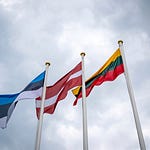Ben Gardner-Gill sits down with Lithuanian political scientist Andžej Pukšto to talk about the results of the 2024 European elections, with a focus on two Baltic members of the European Commission: Kaja Kallas of Estonia and Andrius Kubilius of Lithuania. Both former prime ministers, Kallas and Kubilius have unique challenges ahead of them as Russia’s war in Ukraine continues. Kallas will lead EU foreign policy, and Kubilius will be the first-ever EU Commissioner for Defense and Space. Pukšto shines a light on what they’ll prioritize, what advantages they have entering their new jobs, and how they might overcome the roadblocks ahead.
Transcript
Ben Gardner-Gill: Hello, and welcome to Baltic Ways, a podcast bringing you insights from the world of Baltic Studies. I'm your cohost, Ben Gardner-Gill.
Professor Andžej Pukšto is a political scientist based at Vytautas Magnus University in Lithuania. His research and teaching focuses on European politics and Lithuanian foreign affairs. I sat down with him to discuss the European Union, its executive branch, the European Commission, and two of the Baltic commissioners designate, Kaja Kallas of Estonia and Andrius Kubilius of Lithuania.
Note that we recorded our discussion in October 2024, before the commissioners' European Parliament hearings and before the United States presidential election. Please enjoy.
Professor Pukšto, thank you so much for joining Baltic Ways.
Andžek Pukšto: It's a big privilege for me as well to speak through your channel.
BGG: We'd just like to jump right in. The European Parliament elections of the summer of 2024 resulted in some pretty striking results across the continent. We're going to focus on the Baltic states, Estonia, Latvia, and Lithuania, today.
First of all, at a high level, there is a new European Parliament, and there is going to be a new European Commission. How will the composition of these two bodies affect the interests of the Baltic states, and what do the next five years look like for the Baltic states?
AP: At first I would like to emphasize that all three Baltic countries are still very Euro-enthusiastic. We can see this in all areas of our social life. In reality, the European Union is more of an economic and less of a political union. From the perspective of the Baltic, also to keep in mind, our post-Soviet experience and our look to the European Union is more from a defense perspective and from a security perspective.
So for us, the European Union is the umbrella of economic stability and security.
And, using a comparable perspective, for example, in Poland, there are still a lot of different discussions, different debates, even conflicts between Polish political elites. How deeply integrated is the European Union, and what is the future of Poland in the European Union? They would like to stress a lot that they are not satisfied about the role of Poland in the European Union. And then in Poland we have a lot of voices that believe the European Union is too strongly integrated and the middle countries and small countries are in the shadow of Germany especially, but also in the shadow of France.
When we speak about the Baltics, Baltics are still Euro-enthusiastic. This year we are celebrating the 20th anniversary of Baltic accession to the European Union and to NATO.
There is consensus between the main political forces, the main political parties of Lithuania, that European integration was and is a very positive factor for all three Baltic countries.
And, now I am consulting the result of the last elections in the European Parliament: Here also pro-European political actors are dominant in our Lithuanian representation, but also in the representation of Latvia and Estonia in the European Parliament.
BGG: Yes, absolutely. One of the big trends across the continent was the rise of Eurosceptic parties and representatives, and that wasn't really replicated in the Baltic countries, as you said. Now to go to the theme of the three Baltic countries seeing the European Union as a security apparatus—right, not just NATO, but also the European Union is this defense and security body in a way that it was never intended to be initially, but it's taking on more responsibilities—that's reflected in the portfolio of the Lithuanian commissioner, Andrius Kubilius, who will be taking on defense and space.
And also, Kaja Kallas, former Prime Minister of Estonia, will be the High Representative for External Affairs. That's the most senior role at the European level ever for a Baltic politician.
Could you speak a little bit about what those two positions particularly signify? It seems like the decision-makers in Brussels, so to speak, are recognizing the value of these Baltic voices at the table. What does it mean to have in particular Kallas and Kubilius in these roles?
AP: Of course the biggest reason is connected with the new geopolitical and new security situation in Europe. It was the idea of Ursula von der Leyen to turn European Union discourse and the area of EU politics more toward the Baltic and East Central Europe.
When we speak about the role of different countries in the European Union, the center of decision-making and the center of main events in Europe moved from southern and from central Europe to east-central Europe.
And this is, of course, the result of Russian aggression and the brutal, Russian war in Ukraine. Another reason for this shift, I think, is that Ursula von der Leyen also had good contacts with Baltic center-right political parties and political leaders.
So, two reasons: One is the global European reason and the other is connected to political dependency. So, Lithuanian, Latvian, and also Estonian politicians, during the last Ursula von der Leyen incumbency, were very close with her.
The Baltics here were good partners. On one hand, we need to say the truth: They’re small countries with small influence. But on the other hand, it's also a privilege to have such good partners when you are speaking on the same level and when you understand each other from the first words. So this is one thing.
The third reason: Kaja Kallas became a really popular politician in European Union institutions.
So now if I can jump to Andrius Kubilius. Usually I explain to my students, during their European politics course, that there are two levels of European Commission commissars.
So of course, Kaja Kallas is on the first line, meaning that she plays the role of vice president of the European Commission. The level of Kubilius and Dombrovskis is the second line, not the first line.
Kubilius is also quite famous because he is a representative of a small country. And, it's not necessarily that everybody from France, Italy, or Spain must know Baltic politicians, but in any case, we joke that Kubilus is an old wolf of European politics and of national politics, as he had worked during the last two cabinets as a member of the European Parliament. Before he also was the leader of the Lithuanian Conservative Party and was Prime Minister.
For him, this post is important and he is happy that Lithuania is satisfied about it because it is connected with security and with foreign affairs, being the commissioner of defense and space.
But we mustn’t forget that this is an absolutely fresh area for the European Union. So we need to say very directly, very clearly that in this moment, the European Union doesn't have European army military forces and doesn't even have any background of defense policy.
Kubilus is starting from an empty, white [blank] page, if I can say. So this is really not an easy task for him. And still now, it's not very clear how this coordination of defense of European countries will be happening in the future, if it's going deeper and deeper, or how quickly—or maybe it will be a really slow, coordinated process.
BGG: Right. Absolutely, and, it's interesting, it's exciting to see that Kubilius has this post, but there is this big question mark, right?
AP: Yes, absolutely. Because, even I can say, in general, the activities, the job in general of the European Commission depends a lot on national governments, and so on national leaders.
So this situation in European countries is changing. For the last example, please keep in mind the results of parliamentary elections in Austria when ultra-right forces came in.
Austrian Ultra Rights are quite pro-Russian and of course are not in a rush to create a common European defense policy, just as an example. In general, the job and functioning of the European Commission is really higher math.
BGG: It's different from a national government in so many ways. And there's a great deal of difference between what some commissioners will be able to do and the competencies as the European Union puts it, that they'll have, for those who have those roles, which are more traditional to the European community and the European Union, like the common market.
There are a lot more things that they can do, but for someone occupying a new portfolio like Kubilius, he's going to have to figure it out a little bit.
Do you think that Kubilius will be able to enact real change over the next five years?
What's your prognosis? What do you think is going to happen?
AP: I think it will not be easy for him in any case. The main task for Kubilius, I think, would be to find friends and coalitions in other countries, especially in Western Europe. So this is, I think, the most difficult task for Kubilius: to negotiate; to present his vision of EU defense in Germany, France, Spain, Greece, Italy, and Portugal; and also to deal and negotiate with Eurosceptic leaders in East Central Europe. I especially have in mind Viktor Orban and Robert Fico in Slovakia.
And also to acknowledge the role inside the European Parliament where there are a lot of Eurosceptic forces: The new European Parliament includes a bigger number of Eurosceptic forces than ever before.
So here we need to figure out how to find consensus. But where is the plus, the good side of his post? I think the biggest privilege is good relations with Ursula von der Leyen as a personal connection, but also relations with the main German political forces. So here, Kubilius always had and has good connections, and it is a privilege to discuss with and to be welcomed among German politicians. But there is still a lot of work to do in France, I think, and even in the Netherlands and in Belgium.
It's not a big secret that sometimes our view on security is quite different from the views of southern and of western Europe.
BGG: Absolutely. And that's going to be a challenge of coalition building, as you say. As we're wrapping up here, I want to bring this back out to all three Baltic countries, not just talking about the struggles that Kubilius might have.
Over the last two-plus years since Russia's full-scale invasion of Ukraine in 2022, the Baltic countries have taken on heightened leadership in both the European Union and NATO.
Do you think that will continue? Over the next few years, what might that look like? And what do you think the priorities of the Baltic countries are going to be at the European level?
AP: I do hear a lot of compliments from the United States, and also from European countries, that the Baltic countries are playing a stronger and bigger political game in the modern architecture of foreign affairs and security than they are in reality. This, I think, for people who studied and are studying geopolitics, is good material: sometimes we portray situations where small countries are playing a bigger role than they are in reality. As I said at the beginning of our talk, the center of the decision-making process in European countries, even of political and economic processes, moved during the last two years from the south more to the north, moved from the west more to the east.
What is good is that the United States, also Canada, and the whole transatlantic community, understood that security, activities, and the role of Baltic countries [affect] the background security of all Europe and also the transatlantic world, even the West's security and stability. Last summer, Vilnius hosted the summit of NATO.
Another thing also to keep in mind, and it’s coming [up] quite quickly, is a Lithuanian presidency of the European Union. This will be the second Lithuanian president of the European Union. And last, but not least, also keep in mind that NATO and the European Union had worked a lot toward the security of the Baltic Sea.
And here I think of Finland and Sweden becoming members of NATO: It was a big step in building European and regional security.
When we speak about the priorities of Lithuania, the priorities of the Baltic countries, and also the priorities of East Central Europe, which collaborate with Baltic countries—I have in mind especially Poland, Romania, Czech Republic, who speak as one voice—we are emphasizing the different kinds of security. This includes military security, but we also need to take care of our border—the Baltic countries' border with Belarus and with Kaliningrad (so with Russia as well)—and how to suspend illegal migration in these places, and this is a challenge for us.
Energy security: At least we are separated from Russian gas and oil, but still energy security is current for the whole European Union, but is especially for us.
I also would like to add that Baltic countries always were and are, similarly to Poland, the sCzech Republic, and Romania, quite pro-American.
So maybe we are too romantic, but we are staying in the same position that no matter who will be elected the president of the United States, we would like to save our pro-Americanism because we see that the role of the United States in European security and stability is really big.
BGG: Absolutely. Professor Pukšto, thank you so much for joining Baltic Ways. I really appreciate it. We'll pay attention over the next five years and see what happens at the EU level.
AP: Thank you. Thank you so much.
Baltic Ways is a podcast from the Association for the Advancement of Baltic Studies, produced in partnership with the Baltic Initiative at the Foreign Policy Research Institute. The views and opinions expressed in this podcast are those of the authors and do not necessarily reflect the official policy or position of AABS or FPRI.











Share this post